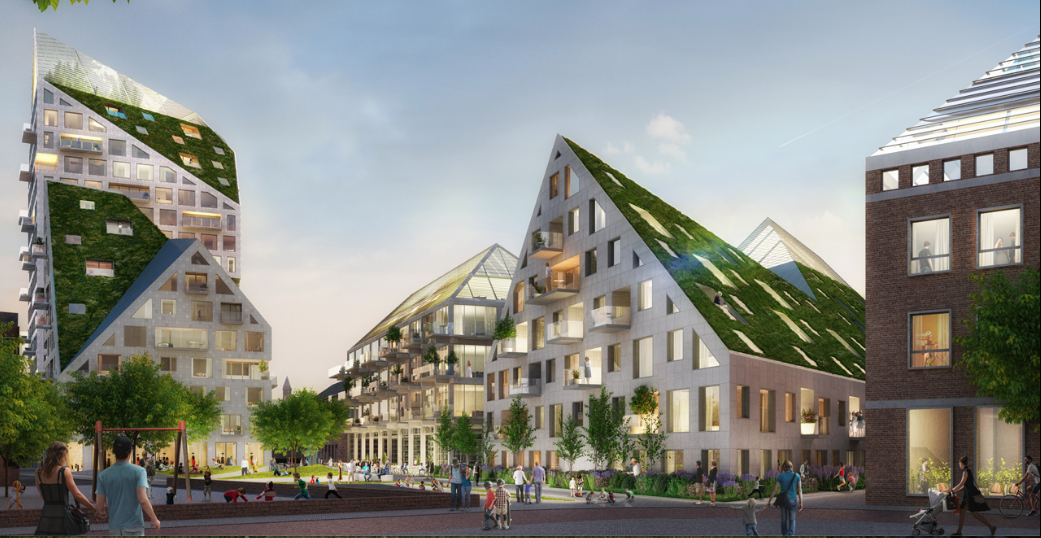There’s a shift going on across Europe.
Western Europe, locked in the post-Great Recession doldrums until 2015, is suddenly booming. Since we started researching cities to start Dispatches Media in 2015, we’ve seen a dramatic rise in rents and cost of living in the innovation centers in the Nordics, Western Europe, Spain and Portugal.
Boom times are great if you’re already established in a country. But if you’re coming into the middle of a boom, it can be tough to find an affordable place to live in a city where you can enjoy the expat lifestyle to the fullest. Moreover, the top innovation centers such as Stockholm, Amsterdam, Dublin, Berlin and London are crazy expensive and over-crowded.
So, where can you have it all? Career opportunities, an affordable place to live, fun and a safe and secure environment?
Last year, we named Eindhoven No. 1 despite the fact no one has heard of it. This was after reconnoitering Vienna, Berlin, Frankfurt, Basel, Amsterdam and Izmir, Turkey, searching for Dispatches headquarters.
To make our list a city has to:
- be in the European Union.
- have a density of talent and serious career opportunities.
- have affordable rents and a reasonable quality of life including affordable schools for those of us who are not original investors in Facebook or Apple.
- have a prominent university driving innovation and creating tomorrow’s talent as in the Silicon Valley model.
- have English as the main business language or at least commonly spoken.
Eindhoven has all that AND a location in the center of Europe, close to the travel destinations that make living in Europe so enticing.
But a lot has changed. Brexit started pushing financial giants such as Goldman Sachs and UBS to leave London to protect passporting rights for transactions. That’s putting pressure on Amsterdam, Luxembourg City, Paris and Frankfurt, which are already booming.
Scandinavia? Fuggit about it. Too expensive, with perpetual housing shortages.
In 2017, the economies of Spain and Portugal, which had been affordable, suddenly joined the boom and even Greece is showing signs of recovery.
So, where to go?
Our value proposition remains the same as for our first list:
If you are offered a position that pays really well, you can have an amazing, glamorous life in cities which aren’t considered the ‘it’ places in Europe. Same for joining a startup or even starting your own business.
In the process of researching this list, we found a great new tool, Teleport, which actually belongs to MOVE Guide entrepreneur Brynne Herbert. Teleport gives people on the move the down-low on 248 cities around the world.
So, let’s crunch some numbers!
No. 1 Eindhoven, the Netherlands
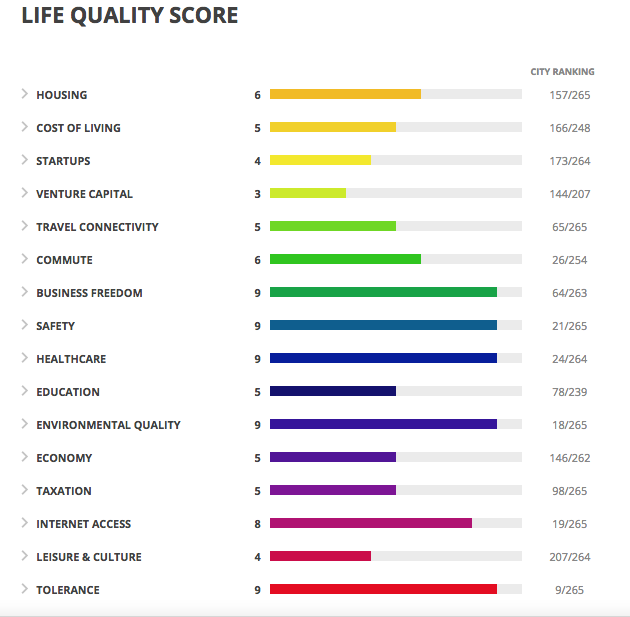 Eindhoven still wins.
Eindhoven still wins.
Barely.
As we posted one year ago, Eindhoven is still the Netherlands’ best-kept secret. Which is why it’s still (sort of) affordable.
But it’s the only innovation center in Western Europe that has it all: a central location close to Amsterdam, Brussels and Düsseldorf; quality of life; talent; affordable housing and the main business language is English.
We live here, so we see its advantages on the micro-economic level. Let’s start with the fact that Eindhoven is among the most affordable cities in the Netherlands, and the Netherlands is a high-functioning society with limitless opportunity and tolerance.
A recent government quality of life study found the extremes of wealth and politics that are increasingly polarizing the United States simply aren’t present here. Oh, and 85-percent of Dutch people surveyed for the study checked the “happy” box.
Finally, we know from personal experience that starting a business here is relatively easy and bureaucracy limited, at least by the standards of Germany, France and Italy.
On the economic development level, this place is poppin’. More and more innovation groups are forming partnerships. More and more housing projects are coming.
There’s just one thing.
Eindhoven’s not that much of a secret anymore, and expats are coming in droves. Eindhoven was runner-up to Copenhagen for 2017 European City of the Year from the Academy of Urbanism. ECofY recognizes “the best, most enduring or most improved cities,” chosen by a group of top architects, city planners and developers based on all sorts of social and commercial factors.
Dutch economic-development officials project they need to recruit about 80,000 highly skilled internationals based on the number of students in the Netherlands, the number of people retiring and estimated job growth and talent requirement for companies.
There are about 40,000 knowledge migrants here in Eindhoven alone including engineers and physicists working at ultra-high-tech firms in the semiconductor industry such as ASML. That number is projected to increase by 75 percent to 70,000 by 2022. That’s already forcing up housing prices here, and our friends in real estate tell us there are fewer and fewer units available in the rental market.
When we first started looking at Eindhoven in 2015, rental rates were still stuck in the Great Recession. Now, it’s difficult/impossible to find a 3-bedroom in the Centrum for less than 2,000 euros per month.
What we wrote last year still holds true, at least until 2019: This town isn’t for everyone … but if you’re talented and ambitious, this is a great place to make your mark.
Eindhoven tops this list simply because of the massive number of career opportunities here, its affordable international school and because it’s really the only affordable major innovation center in Western Europe dominated by Berlin, Copenhagen, Amsterdam and Paris.
The numbers according to Teleport:
Eindhoven scores a lot of 9s – in safety, tolerance, business freedom, healthcare and environmental quality. It gets low marks for venture capital (true) and startups (getting better every day).
The numbers courtesy crowd-sourcing data site Numbeo using Berlin as a baseline:
Apartment (1 bedroom) in City Centre
Eindhoven 922.00 euros, Berlin 700.00-1,000.00 in Berlin
Apartment (1 bedroom) Outside of Centre
Eindhoven 692.80 euros Berlin 500.00-800.00
Apartment (3 bedrooms) in City Centre
Eindhoven 1,388.24 Berlin 1,050.00-1,600.00
Apartment (3 bedrooms) Outside of Centre
Eindhoven 1,055.88 Berlin 000.00-1,300.00
Two biggies:
- International School Eindhoven charges 5,000 euros per year compared to 12,500 to 17,000 euros per year for comparable schools in Berlin.
- Estimated number of estimated job openings for English-speaking expats: More than 2,000 jobs. Just one young company, StudyPortals, has 18 jobs including Chief Happiness Officer (this is the Netherlands). You can see them here.
No. 2 Tallinn, Estonia
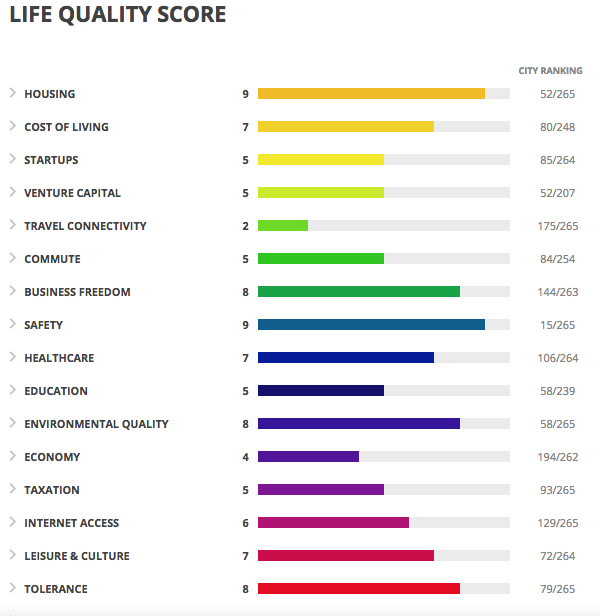 What? You thought this list was going to be a tour of palm trees and beach bars? Right ….
What? You thought this list was going to be a tour of palm trees and beach bars? Right ….
The rule for highly skilled migrants and entrepreneurs is, you make your money before you move to the Côte d’Azur. And Next Wave economies are generally in Northern Europe.
Tallinn is one of those places that’s teleporting into the future.The main reason it remains affordable is because it’s still shaking off the vestiges of being a Soviet Bloc country.
American expat Alex Wellman told us earlier this year that Tallinn is a modern city with a thriving startup scene and a scenic Old Town. Think “a more affordable version of Stockholm or Helsinki … Nordic vibe and culture for half the price,” Alex said.
It’s also the first digital country, with its e-Residency program that’s attracted 10,000 global entrepreneurs who established businesses in Estonia, then run them anywhere in the world.
Of course, the idea of this list is to live there. Tallinn is a hugely underrated tech center with a great university; a city that’s provided the digital talent to create what became Skype and TransferWise. Now, highly skilled internationals are starting to drift to Estonia because there’s more demand than supply when it comes to talent.
The cost of living is rising, but according to our sources, it’s still a lot cheaper than Germany or Sweden. And Teleport ranks it a 9.
Monthly rents start at about 300 euros for a studio apartment, while a lunchtime meal with a drink in town is about 7 euros. Wellman, head of marketing for Estonia’s e-Residency effort, told us he pays about 600 euros per month for a top floor apartment with a balcony, sauna, and sea view in the center of the city!
Try that in Stockholm.
Jobs: TransferWise, Pipedrive, Taxify and other tech companies are hiring right now in Tallinn, Alex said. Also, Estonia has its new startup visa program that helps people move to Estonia.
Here’s a great post on the tech in Estonia including salaries.
No. 3 Leipzig, Germany
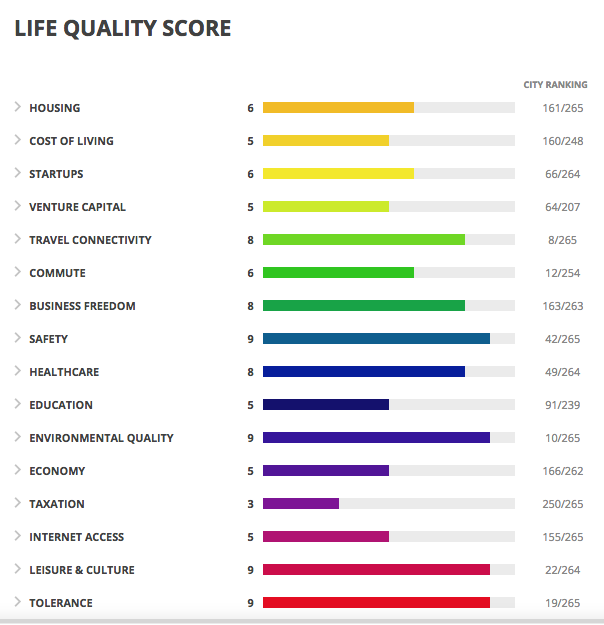 We didn’t see this coming, but once we did the research, it made sense.
We didn’t see this coming, but once we did the research, it made sense.
If you can’t afford Berlin – and fewer of us can as rents rise and housing shortages increase – here’s an alternative with industry, tech, music, culture, affordable schools and a high standard of living in Germany, Europe’s largest economy.
This is courtesy of Dispatches contributor Laura Kaye in Berlin:
A wild card that deserves ‘honorable mention’ is Germany’s Leipzig, which is often referred to as ‘the new Berlin’. It has a reputation as being arty and innovative, boasts a fantastic university, is well connected, and certainly doesn’t suffer from the overcrowding that is pushing up prices and causing increasing competition for accommodations, jobs and kindergarten/school places Berlin. It remains one of Germany’s most affordable cities. Not surprisingly, it has become very popular with young Germans and could be an option for expats looking for a city that offers German quality on a budget, with personality to boot.
Honorable mention? We can do better than that.
When we started researching this, all sorts of posts come up about the city’s industrial might including multiple Porsche operations there. It’s not really a tech center comparable to Berlin, but it’s getting there, with more IoT at the famous Leipzig Trade fair.
There’s a world-class university and even an international school with reasonable fees. And all this is close to Berlin, Frankfurt and Prague.
On Teleport, Leipzig scores eight out of 10 for housing, nine out of 10 for environmental quality and business freedom, and seven out of 10 for tolerance.
Porsche has about 40 jobs openings in Leipzig including internships. You can see them here.
With a median salary for software engineers of $37,158, Leipzig ranks No. 151 for salaries among 265 cities, which explains why the cost of living is lower. (By comparison, the median income in Vienna is $41,000.) Or you could go live in The Valley, where engineers making $200,000 per year commute for hours because they can’t afford to live anywhere near their jobs.
No. 4 Bucharest, Romania
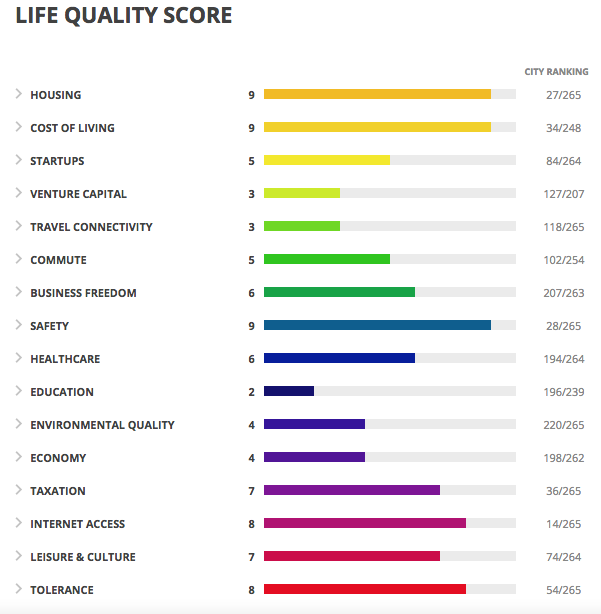 You’re laughing now, but you won’t be. This is the third former East Bloc city on the list.
You’re laughing now, but you won’t be. This is the third former East Bloc city on the list.
What did Steve Jobs say? “You have to skate to where the puck is going, not where it’s been.” Which Jobs attributed to Wayne Gretzky, who never actually said it. But we digress.
No. 4 could just have as easily been Brussels or Hamburg, both relatively affordable cities with jobs and high standards of living. But they’re not the future.
The future is cities such as Sofia, Skopje and, yes, Bucharest … if they can get their acts together, stave off the Far Right and limit corruption.
Romania, Bulgaria and other former East Bloc countries came late to modernity because they were under the Soviet yoke. Sometimes later is better as they’re emerging with young populations educated and hungry.
The funny thing is, Bucharest has crazy scores on Teleport:
Costs of living in Bucharest are in the least expensive 20 percent of all 248 Teleport cities. Nines for housing, cost of living and safety. Eight for internet access … because it’s a tech town.
Cluj-Napoca to the north is already an IT center where Microsoft and other American companies have operations.
Now, Bucharest is seeing tech-sector growth. EY and TechHub Bucharest just launched START-UP Advantage, a partnership through which technology startups will get free EY consultancy in financial controls, accounting and project management.
Cluj and Bucharest are now ranked among the best-performing tech clusters in Europe, according to Milken Institute’s inaugural Best-Performing Cities: Europe 2017 index. The index uses metrics such as job creation, wage gains, manufacturing, and skilled service industry concentration to rank regions.
Corruption is still an issue, and English is not as widely spoken as in the Netherlands or Denmark.
But Romania is an EU country. And in 2017, that’s an advantage.
https://youtu.be/mtP6Mhwxby8
No. 5 Vienna, Austria
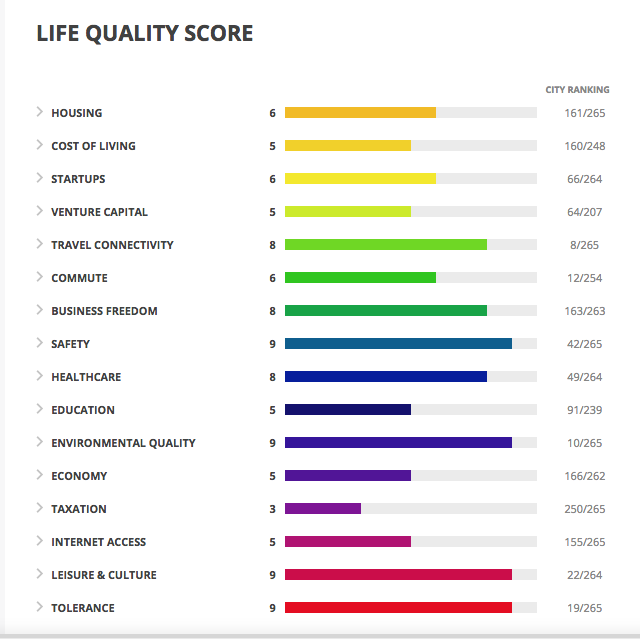 As we’ve posted before, when we were looking for a place to start Dispatches in Europe, contributor and longtime expat Ivana Avramovic insisted Vienna was the place. Exciting and beautiful, and with a large number of multinational corporations and the career opportunities they provide.
As we’ve posted before, when we were looking for a place to start Dispatches in Europe, contributor and longtime expat Ivana Avramovic insisted Vienna was the place. Exciting and beautiful, and with a large number of multinational corporations and the career opportunities they provide.
Vienna is close to the Alps as well as to new and exciting travel destinations such as Slovakia, Slovenia and Croatia.
It checks off a lot of boxes:
• English is an important – though not the main – business language.
• Every quality of life list in the world has Vienna at the top, or highly ranked.
• Vienna just snagged the No. 10 ranking on the new European Digital City Index, which uses hard data to rank how European cities support digital entrepreneurship. It has a notable university.
• Vienna has a density of multinationals with operations/headquarters including Johnson Controls, IBM and GE, and EasyJet is on the way.
• Vienna has one of the best public transportation matrices in the world, and it is affordable.
But this is still a major European capital in a country with a booming economy that’s going to be significantly more expensive than Leipzig and Bucharest. Still, Vienna makes up for that with jobs.
While it’s comparable to Berlin, Vienna is more affordable than London, Paris and Stockholm. Vienna has bright spots including housing demand that doesn’t exceed supply. So, rents aren’t beyond the means of entrepreneurs and expats. (Fun fact; Vienna’s population has actually dropped to 1.8 million people in 2016 from a peak of about 2.2 million residents in 1916 when it was the capital of the Austro-Hungarian Empire.)
Moreover, we’ve had a number of posts about Vienna’s expanding Aspern Seestadt development, which with its own subway access likely will take some pressure off the real estate market.
Vienna is a winning choice for the right (read, “more affluent”) expats.
Teleport gives 9s to Vienna for safety, tolerance, leisure & culture, and still a six for housing.
Not bad for one of the world’s legendary cities.
Up and coming cities:
• Rotterdam. If you ask a Dutch person where they’d recommend expats look, the answer is often, “Rotterdam.” It’s big and sleek and surprisingly affordable for one of the most dynamic cities in Europe.
• Varna, Bulgaria. You can see our latest post here.
• Montpellier, France: In sunny Languedoc on the Mediterranean near Spain, Montpellier has a great university, a young population and a growing tech scene. With more than 7,500 researchers and 70,000 students, Montpellier has attracted R&D efforts for companies such as IBM, Alstom, Schlumberger, Dell and Bausch & Lomb.
• Groningen, Netherlands: Groningen is a university city with a medical school that spins off a lot of MedTech startups. And yeah, it’s way more beautiful (in the conventional sense) than Eindhoven.
Cities that have priced themselves off the 2017 list:
Frankfurt: Last year, No. 2 on our list. This year, the exodus from London post-Brexit is forcing up rentals and the overall cost of living. It’s still a relative bargain compared to Amsterdam and Stockholm, but we can’t recommend it to expats looking for an affordable and stimulating place to go.
Copenhagen: What we were thinking, making Copenhagen No. 5 on last year’s list? What we were thinking was, “Everyone thinks this is the coolest city in Europe … we want to live there.” Dream on.
Last month, the Economist’s Intelligence Unit ranked Copenhagen in a tie for 10th most expensive city in the world. The Economist survey compares more than 400 individual prices across 160 products and services including food, drink, clothing, household supplies and personal care items, home rents, transport, utility bills, private schools, domestic help, and recreational costs.
Cities that are emerging as tech centers, but no one can afford:
• Paris as the French raise amazing amounts of VC funding and cut red tape for businesses.
• Zurich is comfortably ahead of the pack in medtech and pure research.


